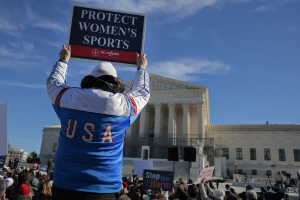Christians don't have to affirm transgenderism, but they can’t express that view at work: tribunal

A London-based employment tribunal has ruled that the British Equality Act protects Christians’ beliefs that do not affirm transgenderism, but they cannot express those beliefs in the workplace.
The Employment Appeal Tribunal in London delivered the judgment Wednesday in a case concerning a Christian doctor whose work contract was terminated over his refusal to refer to a man as a woman.
In July 2018, Dr. David Mackereth, an A&E doctor with 30 years of experience, was forced out of his job in the Department of Work and Pensions. He subsequently took his case to the tribunal which ruled that biblical beliefs on gender are “incompatible with human dignity” and not “worthy of respect in a democratic society.” The doctor then sought to challenge that ruling.
Wednesday’s judgment means that the belief that God created humans as male and female and not transgender is a protected belief under both the Equality Act and the Human Rights Act, said the British charity Christian Concern, whose legal arm, the Christian Legal Centre, represented the Christian doctor.
“Furthermore, it means that more narrow beliefs flowing from that core belief, such as that affirming a transgendered person in their gender identity belief is harmful, are also protected. The right not to believe in transgenderism is also protected,” Christian Concern added.
Justice Eady said in the ruling, “The fact that a belief is likely to cause offense cannot, however, mean that it is automatically excluded from protection.”
However, the appeals tribunal also affirmed that “while the belief, or lack of belief, in transgenderism was protected, its manifestation in the workplace was qualified.”
Andrea Williams, chief executive of the Christian Legal Centre, called the judgment “confusing and muddled.”
“The way in which the judge has driven a wedge between holding a belief and manifesting it means these basic Christian beliefs are protected on paper but not in practice,” Williams said.
“The freedom to hold a belief, but not be able to express it, is no freedom at all,” he added.
Mackereth said he was grateful to the court for at least “recognizing that a belief that we are made by God, both male and female ‘in His image’ is not incompatible with human dignity.”
However, he also said he will be taking the case to a higher court.
Mackereth said everyone in the NHS should be able to say “publicly without fear that a person cannot change sex, but instead we are being forced to accept a massive change to our concept of the medical reality of sex, with no scientific basis for that change.”
He continued: “As Christians, we are not trying to be unkind to people in any way. As Christians we are called to love all people with Christian love. But we cannot love people truly when we live and disseminate a lie. If we are to tell patients that they need to ‘follow the science’, then we must not tell them that they can change sex.”
In 2018, Mackereth was terminated as a medical assessor after refusing to identify clients by their chosen gender identity. In 2019, he took his case to an Employment Tribunal in Birmingham, claiming harassment and discrimination based on his Christian beliefs.
Mackereth said during proceedings that he was asked in a conversation by his line manager: “If you have a man 6 foot tall with a beard who says he wants to be addressed as ‘she’ and ‘Mrs,’ would you do that?” And Mackereth replied that in good conscience, he could not. His contract was subsequently terminated.
But the tribunal ruled in October 2019 that the Department for Work and Pensions had not breached the Equality Act of 2010 by firing the physician, who now works as an NHS emergency doctor.
The tribunal’s judgment was based on a legal precedent set in the 2010 case of Grainger PLC v. Nicholson which looked at what qualifies as a “philosophical belief” which is protected under the Equality Act. And the ruling had put Mackereth’s biblical beliefs on par with neo-Nazi beliefs and was believed to be the first time in the history of English law that a judge had ruled that free citizens must engage in compelled speech.



























